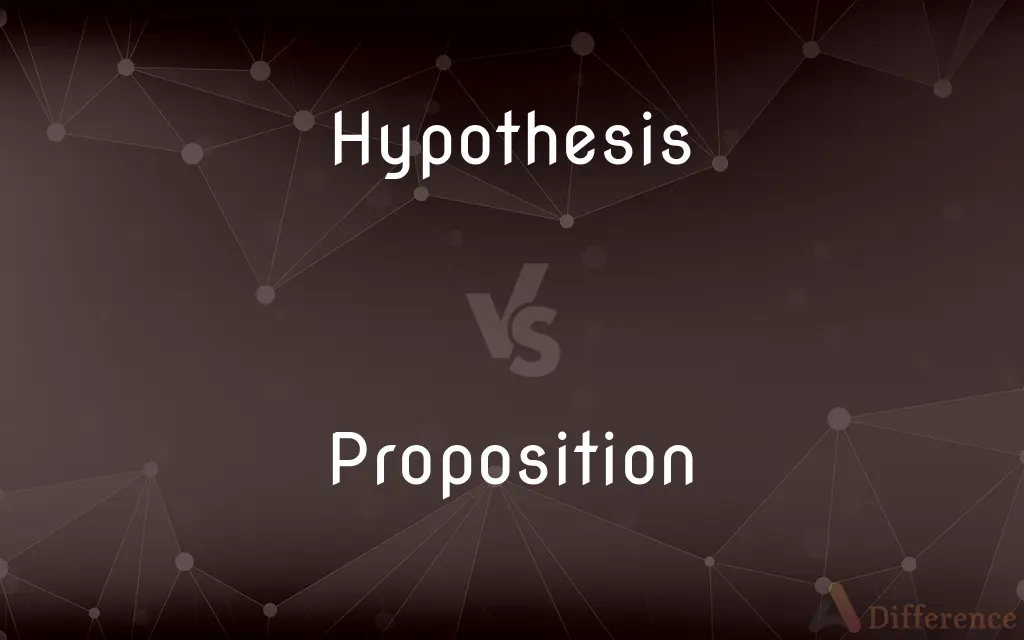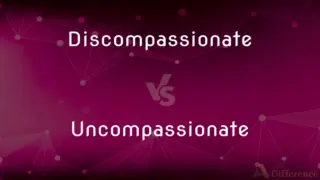Hypothesis vs. Proposition — What's the Difference?
By Tayyaba Rehman & Maham Liaqat — Updated on March 13, 2024
A hypothesis is a testable prediction made before research begins, often used in scientific studies, while a proposition is a statement or assertion that expresses a judgment or opinion.

Difference Between Hypothesis and Proposition
Table of Contents
ADVERTISEMENT
Key Differences
A hypothesis is specifically formulated to be tested through experimentation or observation in the scientific method, aiming to predict an outcome based on certain conditions. On the other hand, a proposition is a broader concept that can be used in various contexts, such as mathematics, philosophy, and logic, representing a statement that can either be true or false, but isn't necessarily designed to be experimentally tested.
Hypotheses are crucial in the scientific process, serving as the foundation for experiments. They are typically structured in a way that allows for clear testing and validation or refutation. Whereas propositions, especially in philosophy and logic, are debated or used as foundational truths upon which arguments are built, not requiring empirical evidence for their validation.
In terms of structure, a hypothesis often includes variables that are deliberately manipulated or observed to gauge effects on certain outcomes, implying a cause-and-effect relationship. Conversely, propositions are generally statements of fact or belief that do not inherently include variables or imply experimentation.
The creation of a hypothesis is guided by existing knowledge, theories, or observations, and its primary goal is to extend scientific understanding through empirical research. On the contrary, propositions can be formulated without the immediate need for empirical testing, serving as theoretical constructs or assertions within arguments.
While hypotheses can evolve into theories or laws through extensive research and validation, propositions may remain as fundamental assertions or truths within a specific theoretical framework or argument, their status unchanged by empirical research.
ADVERTISEMENT
Comparison Chart
Definition
A testable prediction made to be validated or refuted through research.
A statement or assertion that expresses a judgment, opinion, or a theoretical concept.
Context
Primarily used in scientific research.
Used in various fields including mathematics, philosophy, and logic.
Purpose
To predict an outcome based on certain conditions that can be tested.
To express a fundamental truth, opinion, or judgment that can be debated or used as the basis of argument.
Structure
Often includes variables and implies a cause-and-effect relationship.
Typically a declarative statement that does not imply variables or experimentation.
Empirical Testing
Designed for empirical testing and validation.
Not necessarily designed for empirical testing; may serve as a theoretical construct.
Compare with Definitions
Hypothesis
A statement made as a basis for experimentation, often predicting a relationship between variables.
Her hypothesis was that sleep deprivation negatively affects cognitive performance.
Proposition
A statement that expresses an idea, opinion, or judgment.
His proposition was that all public spaces should have free Wi-Fi access.
Hypothesis
An assumption made for the sake of argument or investigation.
The study’s hypothesis was that a balanced diet improves academic performance in teenagers.
Proposition
A premise upon which an argument is based.
The philosopher’s key proposition was that knowledge is inherently limited by the extent of human experience.
Hypothesis
A testable prediction used in the scientific method.
The experiment was designed around the hypothesis that stress impacts memory recall.
Proposition
A suggested plan or scheme.
The committee considered her proposition for a new community center.
Hypothesis
A preliminary explanation for a phenomenon that can be tested scientifically.
The hypothesis suggested that increasing sunlight exposure would enhance plant growth.
Proposition
In mathematics, a formal statement that can be proven true or false.
The proposition that the sum of two even numbers is even was demonstrated.
Hypothesis
A proposition made as a basis for reasoning, without any assumption of its truth.
The scientist presented a hypothesis linking climate change to coral bleaching.
Proposition
A statement in logic that can be true or false.
In logic, the proposition All humans are mortal is considered true.
Hypothesis
A hypothesis (plural hypotheses) is a proposed explanation for a phenomenon. For a hypothesis to be a scientific hypothesis, the scientific method requires that one can test it.
Proposition
In logic and linguistics, a proposition is the meaning of a declarative sentence. In philosophy, "meaning" is understood to be a non-linguistic entity which is shared by all sentences with the same meaning.
Hypothesis
A tentative explanation for an observation, phenomenon, or scientific problem that can be tested by further investigation.
Proposition
A plan suggested for acceptance; a proposal.
Hypothesis
Something taken to be true for the purpose of argument or investigation; an assumption.
Proposition
A matter to be dealt with; a task
Finding affordable housing can be a difficult proposition.
Hypothesis
The antecedent of a conditional statement.
Proposition
A subject for discussion or analysis.
Hypothesis
(sciences) Used loosely, a tentative conjecture explaining an observation, phenomenon or scientific problem that can be tested by further observation, investigation and/or experimentation. As a scientific term of art, see the attached quotation. Compare to theory, and quotation given there.
Proposition
A statement that affirms or denies something.
Hypothesis
(general) An assumption taken to be true for the purpose of argument or investigation.
Proposition
The meaning expressed in such a statement, as opposed to the way it is expressed.
Hypothesis
(grammar) The antecedent of a conditional statement.
Proposition
(Mathematics) A theorem.
Hypothesis
A supposition; a proposition or principle which is supposed or taken for granted, in order to draw a conclusion or inference for proof of the point in question; something not proved, but assumed for the purpose of argument, or to account for a fact or an occurrence; as, the hypothesis that head winds detain an overdue steamer.
An hypothesis being a mere supposition, there are no other limits to hypotheses than those of the human imagination.
Proposition
(uncountable) The act of offering (an idea) for consideration.
Hypothesis
A tentative theory or supposition provisionally adopted to explain certain facts, and to guide in the investigation of others; hence, frequently called a working hypothesis.
Proposition
(countable) An idea or a plan offered.
Hypothesis
A proposal intended to explain certain facts or observations
Proposition
The terms of a transaction offered.
Hypothesis
A tentative theory about the natural world; a concept that is not yet verified but that if true would explain certain facts or phenomena;
A scientific hypothesis that survives experimental testing becomes a scientific theory
He proposed a fresh theory of alkalis that later was accepted in chemical practices
Proposition
In some states, a proposed statute or constitutional amendment to be voted on by the electorate.
Hypothesis
A message expressing an opinion based on incomplete evidence
Proposition
(grammar) A complete sentence.
Proposition
The content of an assertion that may be taken as being true or false and is considered abstractly without reference to the linguistic sentence that constitutes the assertion; (Aristotelian logic) a predicate of a subject that is denied or affirmed and connected by a copula.
“‘Wiktionary is a good dictionary’ is a proposition” is a proposition.
Proposition
An assertion so formulated that it can be considered true or false.
Proposition
An assertion which is provably true, but not important enough to be called a theorem.
Proposition
A statement of religious doctrine; an article of faith; creed.
The propositions of Wyclif and Huss
Proposition
(poetic) The part of a poem in which the author states the subject or matter of it.
Proposition
Misspelling of preposition
Proposition
To make an offer or suggestion to (someone).
Proposition
The act of setting or placing before; the act of offering.
Proposition
That which is proposed; that which is offered, as for consideration, acceptance, or adoption; a proposal; as, the enemy made propositions of peace; his proposition was not accepted.
Proposition
A statement of religious doctrine; an article of faith; creed; as, the propositions of Wyclif and Huss.
Some persons . . . change their propositions according as their temporal necessities or advantages do turn.
Proposition
A complete sentence, or part of a sentence consisting of a subject and predicate united by a copula; a thought expressed or propounded in language; a from of speech in which a predicate is affirmed or denied of a subject; as, snow is white.
Proposition
A statement in terms of a truth to be demonstrated, or of an operation to be performed.
Proposition
That which is offered or affirmed as the subject of the discourse; anything stated or affirmed for discussion or illustration.
Proposition
The part of a poem in which the author states the subject or matter of it.
Proposition
(logic) a statement that affirms or denies something and is either true or false
Proposition
A proposal offered for acceptance or rejection;
It was a suggestion we couldn't refuse
Proposition
The act of making a proposal;
They listened to her proposal
Proposition
A task to be dealt with;
Securing adequate funding is a time-consuming proposition
Common Curiosities
What is a proposition?
A proposition is a statement or assertion that expresses an idea, judgment, or opinion, which can be true or false.
What is a hypothesis?
A hypothesis is a testable prediction or explanation for a specific phenomenon, used as a starting point for scientific research.
Is a hypothesis always proven true?
No, hypotheses can be either supported or refuted by experimental data and may require revision based on research findings.
Can a hypothesis evolve into a theory?
Yes, if a hypothesis is consistently supported by a substantial body of empirical evidence, it can contribute to the development of a scientific theory.
Are propositions subjective?
Some propositions can be subjective, especially those expressing opinions or judgments, while others, like mathematical propositions, are objective.
How does a hypothesis differ from a proposition?
A hypothesis is a testable prediction used in scientific research, while a proposition is a broader statement or assertion that can express a judgment or theoretical concept.
Can a proposition become a hypothesis?
Yes, if a proposition is formulated in a way that allows it to be tested empirically, it can serve as a hypothesis in scientific research.
Why are propositions important in mathematics and philosophy?
Propositions serve as fundamental truths or assertions upon which logical reasoning, arguments, and mathematical proofs are built.
Are all propositions testable?
Not all propositions are designed to be empirically tested; some serve as foundational truths or theoretical assertions in various fields.
How are hypotheses used in the scientific method?
Hypotheses serve as the basis for designing experiments and studies to test predictions about the natural world.
How do researchers formulate hypotheses?
Researchers formulate hypotheses based on previous research, observations, and theories to make testable predictions.
How is a hypothesis validated or refuted?
A hypothesis is validated or refuted through empirical research and experimentation that tests its predictions.
What distinguishes a good hypothesis?
A good hypothesis is clear, specific, testable, and based on existing knowledge and theory.
What role do hypotheses play in experimental research?
Hypotheses guide the design and objectives of experimental research, providing a clear focus for testing and analysis.
Can the truth of a proposition vary by context?
Yes, the truth of some propositions, especially those in philosophy or personal opinions, can vary depending on the context or framework within which they are considered.
Share Your Discovery

Previous Comparison
Discompassionate vs. Uncompassionate
Next Comparison
Military vs. MilitiaAuthor Spotlight
Written by
Tayyaba RehmanTayyaba Rehman is a distinguished writer, currently serving as a primary contributor to askdifference.com. As a researcher in semantics and etymology, Tayyaba's passion for the complexity of languages and their distinctions has found a perfect home on the platform. Tayyaba delves into the intricacies of language, distinguishing between commonly confused words and phrases, thereby providing clarity for readers worldwide.
Co-written by
Maham Liaqat













































